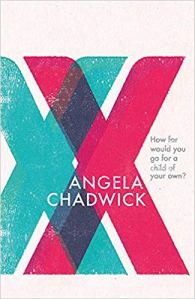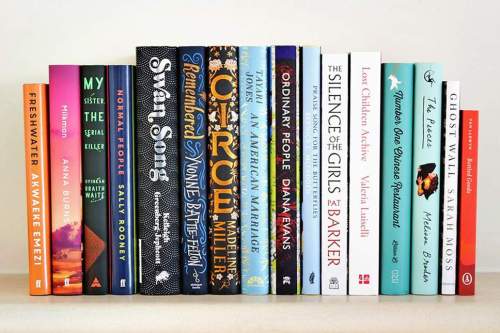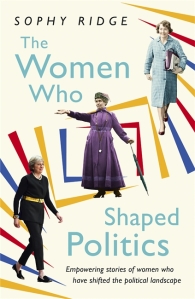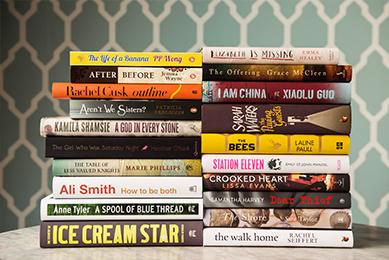
The Women’s Prize for Fiction longlist for 2021 was announced last Wednesday. The 16 titles are:
The Vanishing Half by Brit Bennett
Small Pleasures by Clare Chambers
Piranesi by Susanna Clarke
The Golden Rule by Amanda Craig
Exciting Times by Naoise Dolan
Burnt Sugar by Avni Doshi
Because of You by Dawn French
Unsettled Ground by Claire Fuller
Transcendent Kingdom by Yaa Gyasi
How the One-Armed Sister Sweeps Her House by Cherie Jones
Luster by Raven Leilani
No One Is Talking About This by Patricia Lockwood
Consent by Annabel Lyon
Nothing But Blue Sky by Kathleen MacMahon
Detransition, Baby by Torrey Peters
Summer by Ali Smith Continue reading


 The opening paragraph of ‘XX’ by Angela Chadwick is as good as any to sum up the premise of her debut novel published last year: “After years of controversial research, scientists at Portsmouth University’s Centre for Reproductive Medicine have this morning announced plans to create IVF babies from two women. They’re pushing for a change to the Human Fertilisation and Embryology Act that will make it legal to fertilise an egg with genetic material from a second female.” Lesbian couple Rosie and Jules are quick to take up the opportunity to have a baby of their own through the means of a groundbreaking clinical trial, but a backlash from right-wing movements inevitably creates problems along the way.
The opening paragraph of ‘XX’ by Angela Chadwick is as good as any to sum up the premise of her debut novel published last year: “After years of controversial research, scientists at Portsmouth University’s Centre for Reproductive Medicine have this morning announced plans to create IVF babies from two women. They’re pushing for a change to the Human Fertilisation and Embryology Act that will make it legal to fertilise an egg with genetic material from a second female.” Lesbian couple Rosie and Jules are quick to take up the opportunity to have a baby of their own through the means of a groundbreaking clinical trial, but a backlash from right-wing movements inevitably creates problems along the way. 
 The Women’s Prize for Fiction longlist is due to be announced on Thursday 8th March and I have been thinking about which books could make the cut. My
The Women’s Prize for Fiction longlist is due to be announced on Thursday 8th March and I have been thinking about which books could make the cut. My  Waking Lions by Ayelet Gundar-Goshen (translated from the Hebrew by Sondra Silverston) tells the story of Dr Eitan Green, a neurosurgeon who has recently relocated to the Israeli city of Beersheba and is involved in a collision with an illegal Eritrean immigrant while he is driving home from work through the desert. In a panic, Eitan leaves him to die at the side of the road, but the dead man’s widow shows up the next day on his doorstep holding his wallet which he left at the scene and blackmails him into providing medical assistance to other illegal immigrants in the area. To complicate matters even further, Eitan’s wife Liat is the police detective tasked with uncovering the identity of the driver who left the scene of the hit-and-run.
Waking Lions by Ayelet Gundar-Goshen (translated from the Hebrew by Sondra Silverston) tells the story of Dr Eitan Green, a neurosurgeon who has recently relocated to the Israeli city of Beersheba and is involved in a collision with an illegal Eritrean immigrant while he is driving home from work through the desert. In a panic, Eitan leaves him to die at the side of the road, but the dead man’s widow shows up the next day on his doorstep holding his wallet which he left at the scene and blackmails him into providing medical assistance to other illegal immigrants in the area. To complicate matters even further, Eitan’s wife Liat is the police detective tasked with uncovering the identity of the driver who left the scene of the hit-and-run.  ‘The Women Who Shaped Politics’ by Sophy Ridge offers a broad overview of the female campaigners and Members of Parliament who have shifted the political landscape in Westminster. The first half focuses on historical pioneers such as Mary Wollstonecraft and those involved in the suffragette movement while the second half draws on interviews with a range of contemporary female politicians including current Prime Minister Theresa May.
‘The Women Who Shaped Politics’ by Sophy Ridge offers a broad overview of the female campaigners and Members of Parliament who have shifted the political landscape in Westminster. The first half focuses on historical pioneers such as Mary Wollstonecraft and those involved in the suffragette movement while the second half draws on interviews with a range of contemporary female politicians including current Prime Minister Theresa May. 
 Having had some success with my
Having had some success with my  One of the books which kept cropping up frequently in lots of end-of-year book lists last month was ‘The Power’ by Naomi Alderman and so it got bumped up my TBR list as one of my not-very-festive Christmas holiday reads. The main concept of Alderman’s fourth novel explores what would or could happen in a world where women become more powerful than men in every sense. Due to a mutation caused by a nerve agent used during the Second World War, teenage girls develop the ability to release electrical jolts through their fingertips which can be either harmless or strong enough to kill people. The “power” eventually spreads and although it is initially used by women as a deterrent against violent and abusive men who have oppressed them, it has far-reaching implications beyond that.
One of the books which kept cropping up frequently in lots of end-of-year book lists last month was ‘The Power’ by Naomi Alderman and so it got bumped up my TBR list as one of my not-very-festive Christmas holiday reads. The main concept of Alderman’s fourth novel explores what would or could happen in a world where women become more powerful than men in every sense. Due to a mutation caused by a nerve agent used during the Second World War, teenage girls develop the ability to release electrical jolts through their fingertips which can be either harmless or strong enough to kill people. The “power” eventually spreads and although it is initially used by women as a deterrent against violent and abusive men who have oppressed them, it has far-reaching implications beyond that. 





 Life After Life by Kate Atkinson
Life After Life by Kate Atkinson





You must be logged in to post a comment.